
The IFSC has announced a new athlete health policy concerning Relative Energy Deficiency in Sport (RED-S) and eating disorders ahead of the 2024 season. In order to be declared fit to compete, athletes will undergo screening and evaluation via their national federations combined with 'random and focused' in-competition testing by the IFSC. This IOC-backed, targeted RED-S policy is the first of its kind in the sporting world.
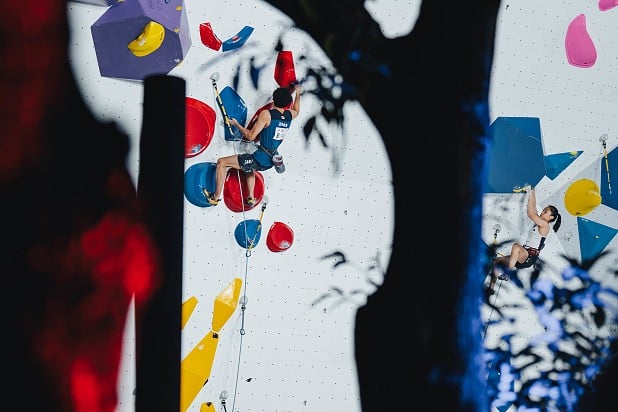
The announcement of the policy follows the resignation of two doctors from the IFSC Medical Commission citing a lack of action on these issues and public criticism from athletes including Olympic champion Janja Garnbret (UKC News).
The root cause of RED-S is low energy availability, when an athlete does not consume enough calories to support their energy expenditure through physical activity, leaving inadequate energy to support normal body functions.
According to the IOC Medical Commission, RED-S is defined as 'impaired physiological functioning caused by relative energy deficiency and includes, but is not limited to, impairments of metabolic rate, menstrual function, bone health, immunity, protein synthesis and cardiovascular health.'
A number of affected athletes experience only subtle symptoms of RED-S (including but not limited to fatigue and weight loss) and many are unaware of their health issues prior to diagnosis (UKC article).
While Body Mass Index testing - a measurement of health based on a person's weight divided by their height squared - has been used in the past by the IFSC, the use of this method alone was not deemed sufficient for diagnosing RED-S.
The IFSC's Medical Commission, led by Professor Naama Constantini, who is part of the IOC RED-S Expert Consensus Group, concluded that 'a more comprehensive screening procedure was required to ensure an accurate picture of an athlete's health.'
In order to obtain an IFSC Athlete Licence for the season, the new policy states that all athletes must be issued a health certificate by their national federation. The certification process, led by national federations, involves athletes providing both basic medical measurements and completing self-reported questionnaires about their mental and physical health and eating and training habits.
The basic measurements required are an athlete's height, weight, and BMI (without shoes, in climbing kit or similar, with empty pockets), heart rate (at rest and seated) and blood pressure (at rest and seated). The IFSC recommends that these assessments be carried out by a certified medical practitioner affiliated to the federation, but the measurements can also be done by independent practitioners and are considered simple enough to be carried out by national federation representatives and - in a worst-case scenario - athletes themselves if their federation lacks resources and support.
If an athlete's scores fall within a healthy range for their age and sex, as outlined in the policy, a health certificate and licence will be issued.
Otherwise, 'Athletes of Concern' falling outside these parameters will be referred for further medical and laboratory evaluations. The IFSC recommends that 'all Athletes of Concern should be referred for further medical, mental health and nutritional evaluation by qualified eating disorder/REDs professionals.'
The scores and measurements from both the questionnaires and the medical testing will then be inputted into the International Olympic Committee's RED-S Clinical Assessment Tool to determine eligibility for an IFSC licence.
Athletes will be categorised using a coloured triage system: green - no or low health risk, cleared to compete; yellow - mild risk, cleared to compete; orange - moderate to high risk; cleared to compete with further evaluation and treatment throughout the season; red - no participation until cleared by national federation medical personnel.
While the responsibility of providing 'clearance' for athletes to compete largely falls on the national federation, the IFSC will also undertake 'random and focused' health testing (including BMI, heart rate, and blood pressure) on the day before each IFSC event throughout the season, including Olympic selection events and during the Paris 2024 Olympic Games. The focus of the pre-event testing will be partly data-driven and athletes lacking medical support from federations will likely be among those selected.
The data gathered independently at events will be compared with data from national federations by a newly-appointed independent committee, which can restrict at-risk athletes from participation.
The REDs - Independent Advisory Committee (R-IAC) will include a minimum of two medical doctors with expertise in RED-S, one health professional with expertise in climbing. The R-IAC will not include members of the IFSC Medical Commission or medical personnel working directly with any national federation.
Any decision to restrict an athlete from competing made by the committee will be enforced by the IFSC. National federations may appeal the decision before an independent conflict resolution body called Sport Resolutions. A restricted athlete may only return to competition if they demonstrate sufficient recovery and have been cleared to participate by national federation medical personnel.
The policy states that federations can contact the IFSC Medical Commission if they need assistance with further RED-S evaluation or return to training/competition decisions.
The IFSC will also be responsible for ensuring the athletes' privacy and securing the personal data collected, taking into consideration both the 'protection of the health and rights of athletes.'
A long-considered 'holistic approach' to an enduring issue in the sport
Dr Eugen Burtscher, former chair of the IFSC medical commission, and Dr Volker Schöffl, a former member of the commission, resigned from their voluntary positions last July.
Dr Schöffl wrote online that despite over ten years of researching the health of climbing athletes and advising the IFSC, 'as medical doctors [they could] no longer accept the non-action of the IFSC concerning the RED-S problems of [their] athletes.'
Around a decade ago, the IFSC began to implement occasional BMI in-competition checks, which became more frequent in recent years. If an athlete's body mass index fell below the critical values for men and women (18.5 and 17.5 respectively), a warning letter would be sent to the relevant national federation. Responsibility lay with the federation to restrict participation and seek help for the athletes.
The IFSC issued a statement on 6 July in response to the resignations, reiterating a plan to take 'a holistic approach not based solely on BMI parameters, which alone are not sufficient to determine critical health condition' starting in 2024.
'There have been calls for Body Mass Index (BMI) to be used as a yardstick for REDs, but on its own, a simple BMI test does not provide an accurate picture of a person's health and, importantly, would also not be legally defensible,' said IFSC General Director Piero Rebaudengo. 'In addition, BMI varies greatly from one country to another. Excluding athletes from competition based only on a BMI reading would therefore be a gross violation of their rights.'
Previously, testing was done mid-competition - as opposed to the day before in the new policy - which one athlete described on social media as having a negative psychological impact ahead of their performance.
BMI testing ceased in the 2023 season while the IFSC sought a more comprehensive testing system, which prompted a number of athletes, coaches and health professionals to speak out.
Olympian Alannah Yip was amongst the first to call out the organisation for dropping BMI testing and turning a blind eye to issues. 'Climbing has a cultural and systemic weight problem,' she wrote on Instagram. 'It's a dirty little non-secret that everyone knows about but no one does much about. In a sport where you are fighting gravity, weight clearly plays a role.'
Slovenian Olympic gold medallist Janja Garnbret appealed to the IFSC to put eating disorders and RED-S 'on top of the agenda', asking 'Do we want to raise the next generation of skeletons?'
The issues raised by athletes received coverage in mainstream media.
While the prevalence of eating disorders in competition climbing - and in the sport more broadly - is difficult to quantify (in August 2022, UKC asked the IFSC how many BMI warning letters had been issued, but this information was not provided), in one 2022 study by Dr Volker's team using a self-selecting questionnaire, 14.9% of female climbers on the IFSC circuit said that they currently had an eating disorder and 15.8% reported that they had lost their periods. A common RED-S symptom, amenorrhoea and the resulting oestrogen suppression can have serious implications for bone, cardiovascular and reproductive health.
But RED-S and eating disorders do not only affect women and girls, and its prevalence in climbing is nothing new.
'I have dealt with the German team and high-level professional climbers for 25 years and have had this as a constant issue throughout my whole professional career,' Dr Schöffl told UKC last year.
Commenting on the new protocol, IFSC President Marco Scolaris said:
'The new system underscores our commitment to the health of our athletes. The policy will not only help us determine which athletes are most at risk, it will also help raise awareness of the issue, provide help to those who need it, and ensure the rights of each athlete are protected.
'National Federations are key to the success of the new policy, as the health and welfare of the athletes fall under their jurisdiction at the national level. We look forward to collaborating with them closely on this matter.'
The responsibility placed on national federations has raised questions online as to whether governing bodies can be trusted to act in the best interests of their athletes, when medals and financial incentives may be at stake, and whose screening methods 'may vary in rigour', as noted in the 2022 study.
Last week, GB Climbing released a new athlete health policy detailing physical and mental health screening, athlete health referral pathways, injury prevention and educational programs, a mental health strategy, an action plan and working group in addition to plans for ensuring safe training environments and inclusivity.
'The policy maintains the inclusion of a BMI measure in medical screening processes, in accordance with current IFSC policies and procedures,' GB Climbing's announcement reads.
Referring to the IFSC's new guidelines, the governing body announced that 'the BMC commits to aligning its policies accordingly,' and that 'referral pathways will still be used as per the [GB Climbing] policy in cases where an athlete's BMI raises concerns during medical screening.'
President of the Athletes' Commission and Olympian Shauna Coxsey said of the IFSC's new policy:
'Athlete health, wellbeing and safety has and will always remain a priority for the Athletes' Commission. The policy announced today is the start of the journey towards making our sport safer by addressing a complex and sensitive topic. As President of the Athletes' Commission, I will continue to work with my fellow Commission members to ensure the athlete's voice is heard and they are supported as these new policies are implemented. I would like to thank the Medical Commission and Sport Department for the hard work and dedication they have shown in developing this policy. We believe this is a positive step towards protecting athletes.'



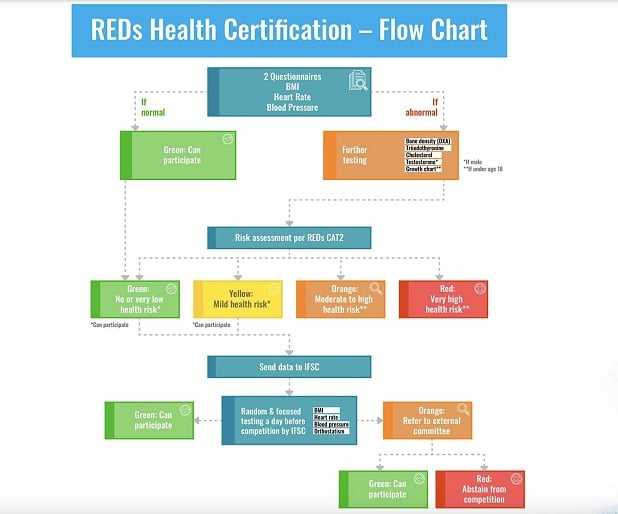





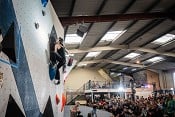

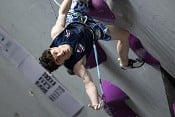
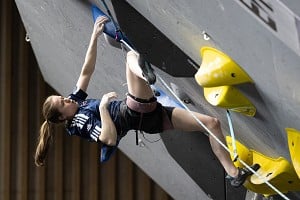
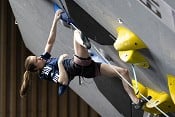
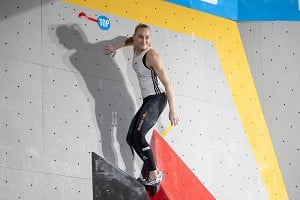
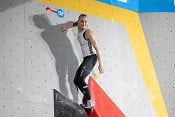
Comments
Let’s hope the BMC / GB Climbing adds the IFSC info as an appendix to its Welfare Policy.
However I am worried by leaving it to National Federations to monitor I suspect some Federations may be very reluctant to suspend a high performing athlete as it could affect sponsorship, rankings, etc etc (not accusing GB Climbing of this) but there are some unscrupulous Federations out there. The proof will be in the pudding to see if this starts to work, it is definitely a step in the right direction, however it will only be effective if it is well monitored.
yeah, i feel like that’s the problem with every realistic approach to this – more airtight systems can be imagined, but are they realistic? but if i recall correctly, one big point of criticism was that the IFSC did collect quite some data, but all it could do was write mildly worded letters to the respective national federations.
compared to that, it looks like they did step up to a degree:
1. the IFSC now provides outlines for what the national federations need to provide for each athlete. they are far from cheat proof, but they can be performed by national federations that are super young, barely funded, or far from the medical infrastructure needed to provide more conclusive diagnoses. and given that part of the call to action came from athletes as well, i hope the base of support for these measures is broad enough across multiple strata to provide some motivation to not get caught playing fast and loose with them.
2. with the IFSC doing some random testing, there’s a chance to catch people/federations grossly futzing with data. evaluation of data for the issuing of licences is also in the hands of the IFSC via their assessment tool. and with athletes of concern requiring clearance from qualified professionals in matters REDs, it’s probably a bit more involved to cheat your way out of things on that end as well.
compared to how unilateral things were before – national federations sending athletes, and the IFSC being unable to enact any consequences, even with solid evidence in hand – they are involved to a higher degree now.